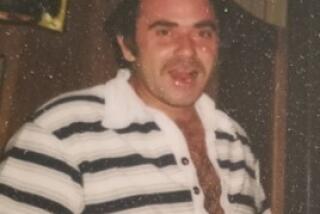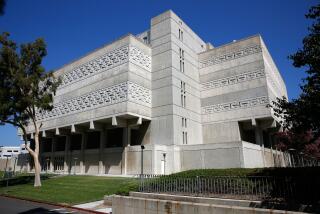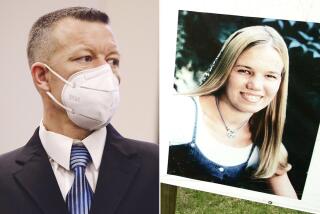Oleander Poisoning Case May Be Dropped : Courts: Prosecutors say no evidence has been found so far in tissues taken from the dead man’s body.
The murder charge against a Glendora man accused of poisoning a business rival will probably have to be dismissed for lack of evidence, prosecutors said Tuesday.
Harvey Giss, appointed by the Ventura County district attorney’s office to prosecute David W. Sconce, said sophisticated tests so far have found no evidence of oleander poisoning.
If the charge is dismissed, Sconce, who has spent more than a year in Ventura County Jail awaiting trial, could still face a charge of conspiracy to commit murder in an unrelated Los Angeles case.
In the Ventura County case, Sconce, 35, is accused of using oleander to kill Burbank mortician Timothy Waters in 1985. Prosecutors had intended to seek the death penalty.
But on Tuesday, the first day of trial, they were seeking a delay in the case because the tests have not uncovered the evidence they expected.
“It doesn’t look favorable that we’re going to get the results we want,” Giss told Ventura County Superior Court Judge Frederick A. Jones. “But we will have to see it through to the end and wait for the report.”
Giss said chemist Jack Henion, a Cornell University professor who is analyzing tissue samples from Waters’ remains, has found no signs of oleandrin, the poisonous juice of the oleander plant. Henion now is looking for a substance that is formed when oleandrin breaks down in the body.
If that substance does not turn up, “it would lean toward the conclusion that it never was there,” said Kevin G. DeNoce, a Ventura County deputy district attorney who is assisting Giss.
Giss asked for a week’s postponement of the trial until Henion can complete his tests. “I don’t want to be criticized if we start jury selection and then we dismiss the case a week from today,” Giss told the judge.
But Jones ruled that there was insufficient cause to delay the trial.
Waters lived in Burbank and Sconce in Glendora, both in Los Angeles County. The case is being tried in Ventura County because Waters died at his mother’s home in Camarillo.
Ventura County Dist. Atty. Michael D. Bradbury appointed Giss, a Los Angeles County prosecutor, to handle the murder trial because he is familiar with other cases involving Sconce.
When the 300-pound Waters died in 1985 at age 24, the death was attributed to a heart attack. But three years later, after informants alleged that Sconce had bragged about killing Waters with a poisoned drink, investigators reopened the case.
Prosecutors admitted that they had no evidence that Sconce and Waters were together in the days before Waters’ death, but they filed the murder charge in February, 1990, after a Pennsylvania chemist said he found signs of oleander poisoning in Waters’ remains.
Sconce’s attorney, Roger Jon Diamond, wanted additional tests and got a court order to have the body exhumed. He discovered that Cornell University had the most sophisticated equipment available for such oleander testing and arranged for Henion to perform the tests.
At the same time, DeNoce, who was assigned by Bradbury to work with Giss, decided to double-check the Pennsylvania results and also heard about Henion. So the defense and prosecution agreed to share the costs of the tests.
Giss said Tuesday that Henion’s results will be more reliable because the chemist is using “state of the art equipment,” while the Pennsylvania analyst relied on “antiquated equipment.”
Sconce, whose family owned a Pasadena funeral home, has denied killing Waters but admitted hiring two men to beat him up. The two men testified at a preliminary hearing that Sconce was angry at Waters for spreading rumors about illegal operations at Sconce’s funeral home.
Bradbury ultimately will decide whether to drop the murder charge, DeNoce said.
Sconce served more than two years in prison for assault and for convictions stemming from illegalities at the mortuary. If the murder case is dismissed, he still faces a charge of conspiracy to commit murder in an unrelated case, Giss said.
More to Read
Sign up for Essential California
The most important California stories and recommendations in your inbox every morning.
You may occasionally receive promotional content from the Los Angeles Times.










